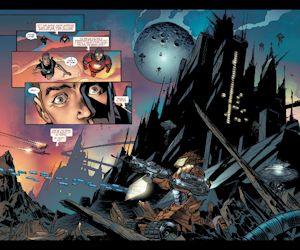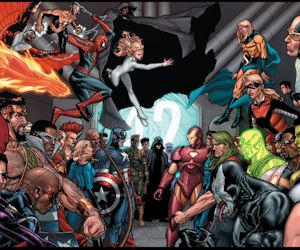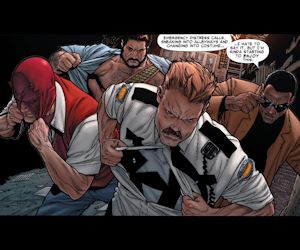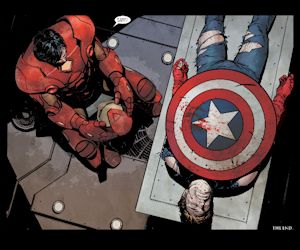7 Problems in Adapting Marvel's Civil War - Page 2
The Negative Zone
 | | It's an unpleasant corner of the multiverse |
One of the most critical plot-points in the comics' Civil War involves a prison built by Stark and Richards that is used to house captured superheroes. This prison is ultimately Stark's endgame and the whole reason he pushes the Civil War into being. Stark knows that this prison is necessary to contain the threats of supervillains across the Marvel universe like the Mandarin, Magneto, Thanos, Loki, etc., but he doesn't have the means or budget to create it himself. He uses the war as an excuse to build it with government funds, and when the war is finally over, he pardons all the superheroes housed there but keeps the prison in order to hold the bad guys. Where this becomes problematic for the MCU, though, is in the prison's location, an alternate dimension (discovered by the Fantastic Four, thus probably not in Marvel's film rights catalogue) known as the Negative Zone and filled with antimatter and psychic energy that serves to keep its prisoners in utter submission. Marvel has proved it can get away with a lot of comic book craziness, but the Negative Zone is probably a few steps too far into the absurd, even for them.
Not Enough Heroes/Villains
 | | Notice they're fighting before the answer to life, the universe, and everything |
The thing that makes Civil War so epic is its scope. It involves hundreds--if not thousands--of superheroes and supervillains. The triggering event involves a team of young heroes on a reality television show going up against villains way out of their league and accidentally killing hundreds of innocent civilians. One of the most controversial moves is when Stark employs villains such as the Thunderbolts and the Green Goblin, and the rebels counter by seeking the assistance of the Atlanteans and the Punisher and forming the New Avengers. The MCU, though, doesn't have nearly as many toys in its toybox, meaning that it has to make due with a much smaller group of heroes and villains. It stands to reason that Captain America will have Falcon (and maybe Bucky Barnes and/or Black Widow) on his side, but there aren't many other secondary heroes to throw into the mix, especially with Thor out of the equation. As for Tony, maybe he has War Machine, Agent Hill, and Hulk on his side (Hulk is actually in space during the war in the comics), but that's hardly enough to make an army capable of taking out superheroes. There also aren't many villains--if any--that require the superprison that is the whole point of the war. Are we to believe that Tony's building it just for Whiplash, Loki, and the Abomination? Remember, he doesn't know about Thanos or the cosmic side of the MCU yet. Even if he learns about all that in the meantime, he would find himself making the same argument that Nick Fury made in The Avengers, an argument he vehemently disagreed with.
The Superhero Registration Act
 | | Luckily, without alter egos, we won't have the alter alter egos subplot |
The most significant difference between Marvel's comic universe and its cinematic one is the use of alter egos. In the comics, the heroes protect their secret identities with a passion--as they believe it keeps them safe--and their primary objection to the Superhero Registration Act that sparks the war is that it requires them to reveal themselves. When Iron Man takes off his helmet in the comics and shows the world that he is Tony Stark, it is a surprise, whereas in the cinematic universe, everybody already knows that Iron Man is Tony Stark. Indeed, none of the main superheroes in the MCU have secret identities. Even Black Widow reveals her identity at the end of Captain America: Winter Soldier, so that raises the question: what is the cinematic Civil War going to be about?
 | | Spoiler Alert |
What all this leads me to believe is that Captain America: Civil War is going to be a much smaller and more personal story than its comic book counterpart. The central argument will be at least somewhat different: the superprison probably won't be Tony's driving motivation, and Captain America probably won't be talking about how secret identities should be a protected civil liberty. It is unlikely to be about the future of S.H.I.E.L.D., and I doubt it will give birth to The Initiative. I don't foresee a conflict involving a cloned Thor or the friction between Captain America and the Punisher, nor do I think it's possible to include central characters like Spider-Man and Reed Richards. In other words, fans looking for the comic book version of Civil War on the silver screen are bound to be disappointed.
One aspect of Civil War that poses no significant problem is the conclusion, in which Captain America is assassinated (by Crossbones on orders of the Red Skull) after giving himself up to end the bloodshed. This is a huge blow to Tony Stark's character, who tells Cap's corpse that, depite believing his own actions to be wholly justified, "it wasn't worth it." Additionally, it sets up Bucky Barnes (the Winter Soldier) to become the next Captain America, which would be a way forward for Marvel now that its film stars are starting to run out of contract time. Indeed, the final chapter of the Civil War comics is easily the best part of the entire story arc, so here's hoping they keep it as intact in the film as possible. Everything leading up to it is fair game, though, because it is all just set dressing for one of the biggest deaths in Marvel history.
-e. magill 11/11/2014
|
|